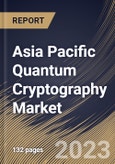The principles of quantum mechanics are used in quantum cryptography, commonly called quantum encryption, to encrypt messages so that nobody outside of the intended recipient can ever read them. It takes advantage of quantum's multiple states in conjunction with its "no change theory," which means it cannot be inadvertently interrupted. It is a process that involves the utilization of photons in order to generate a cryptographic key, which is then sent to the intended receiver using the most suitable communication route.
Quantum entanglement, which asserts that two particles can be connected even when widely separated, is the foundation of quantum cryptography. As a result, it is practically impossible for anyone other than the intended recipient to access the data being transferred because any attempt to intercept it will be immediately detected.
Quantum cryptography has extensive prospective applications. It could protect financial transactions, confidential government documents, and medical records. It might also be used to safeguard data stored in the cloud. Quantum cryptography could also be applied to quantum computing, offering improved defence against malicious attacks.
The legacy approach to business has been transformed into a modern approach by digital technologies. Additionally, the region is developing into a new digital transformation hotspot due to increased investments in digitization across potential economies. With the participation of approximately 170,000 domestic businesses, the size of the nation's data sector increased substantially (by more than 14.3%), and 2.2 million Koreans received a variety of digital transformation advantages. The regional market is expected to have growth prospects due to the region's increasing digitalization and the consequent rise in data generation.
The China market dominated the Asia Pacific Quantum Cryptography Market by Country in 2022 and would continue to be a dominant market till 2030; thereby, achieving a market value of $375.3 Million by 2030. The Japan market is estimated to witness a CAGR of 40.2% during (2023-2030). Additionally, India's market would showcase a CAGR of 42% during (2023-2030).
Based on Vertical, the market is segmented into Government & Defense, Retail & eCommerce, IT & Telecom, BFSI, Healthcare & Lifesciences and Others. Based on Security Type, the market is segmented into Network Security and Application Security. Based on Offering, the market is segmented into Solution (Quantum Key Distribution, Quantum Random Number Generation and Others) and Services. Based on countries, the market is segmented into China, Japan, India, South Korea, Singapore, Malaysia, and Rest of Asia Pacific.
The market research report covers the analysis of key stakeholders of the market. Key companies profiled in the report include IBM Corporation, Hewlett Packard Enterprise Company, Toshiba Corporation, NEC Corporation, MagiQ Technologies, Inc., Crypta Labs Limited, Qubitekk, Inc., ISARA Corporation, Nucrypt LLC, and Qrypt
Scope of the Study
By Vertical
- Government & Defense
- Retail & eCommerce
- IT & Telecom
- BFSI
- Healthcare & Lifesciences
- Others
By Security Type
- Network Security
- Application Security
By Offering
- Solution
- Quantum Key Distribution
- Quantum Random Number Generation
- Others
- Services
By Country
- China
- Japan
- India
- South Korea
- Singapore
- Malaysia
- Rest of Asia Pacific
Key Market Players
List of Companies Profiled in the Report:
- IBM Corporation
- Hewlett Packard Enterprise Company
- Toshiba Corporation
- NEC Corporation
- MagiQ Technologies, Inc.
- Crypta Labs Limited
- Qubitekk, Inc.
- ISARA Corporation
- Nucrypt LLC
- Qrypt
Unique Offerings
- Exhaustive coverage
- The highest number of Market tables and figures
- Subscription-based model available
- Guaranteed best price
- Assured post sales research support with 10% customization free
Table of Contents
Companies Mentioned
- IBM Corporation
- Hewlett Packard Enterprise Company
- Toshiba Corporation
- NEC Corporation
- MagiQ Technologies, Inc.
- Crypta Labs Limited
- Qubitekk, Inc.
- ISARA Corporation
- Nucrypt LLC
- Qrypt








